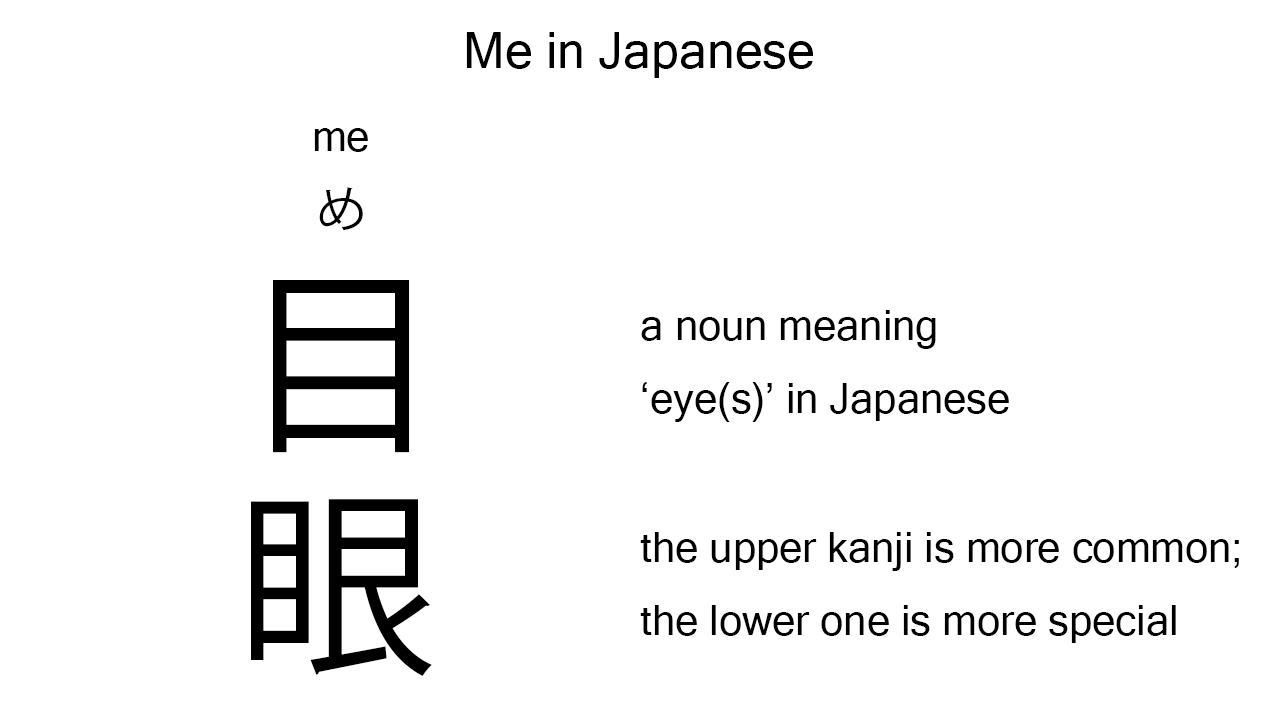How to say “eye” in Japanese
Native speakers say “me” to mean ‘eye’ or ‘eyes’ in Japanese. Perhaps, some Japanese learners know this word as it is sometimes used in Japanese conversations. In this blog post, however, I will explain it together with its kanji expressions. And also, I will explain how to use it through example sentences. My explanations would help Japanese learners better understand how to say “eye” or “eyes” in Japanese. Then, let’s get started!
Contents
Definition and meaning of “me”
Let me start with the definition and meaning of “me”.
- me – 目/眼 (め) : a noun meaning ‘eye’ in Japanese. This can also work as plural. Learn more about Japanese plural.
This noun has two different kanji expressions. The first one is more common; the second one is used mainly in more specific fields like literature and medical science. When we want to write “me” in kanji, basically we can use the first one.
The second kanji character can also be pronounced “manako”. However, the use of this pronunciation is quite limited. Of course, we can say “manako” to mean ‘eye’ or ‘eyes’ in Japanese, but this would sound a bit weird to the native speakers.

So far, I’ve explained the definition and meaning of “me” together with its kanji characters. Then, let me explain how to use it through the example sentences below.
Example #1: how to say “eyes” in Japanese
musume no me wa totemo utsukushii – 娘の目はとても美しい (むすめのめはとてもうつくしい)
My daughter’s eyes are very beautiful.
Below are the new words used in the example sentence.
- musume – 娘 (むすめ) : a noun meaning ‘daughter’ in Japanese. This can also work as plural.
- no – の : a case particle used after a noun or pronoun to make its possessive case. In the example, this is used after “musume” to make its possessive case, “musume no”, which can mean “my daighter’s” in Japanese.
- wa – は : a binding particle working as a case marker or topic marker. In the example, this works after “musume no me” to make the subject in the sentence.
- totemo – とても : an adverb of degree meaning ‘very’, ‘much’, ‘so’, or such in Japanese. In the example, this works in front of “utsukushii” to emphasize its meaning.
- utsukushii – 美しい (うつくしい) : an i-adjective meaning ‘beautiful’ in Japanese.
This is a typical usage of “me”. In this example, it works as a part of the noun phrase, “musume no me”, which means “my daughter’s eyes” in Japanese.
Example #2: another usage of “me”
kanojo no me no iro wa fukai ao desu – 彼女の目の色は深い青です (かのじょのめのいろはふかいあおです)
The color of her eyes is deep blue.
Below are the new words used in the example sentence.
- kanojo – 彼女 (かのじょ) : a pronoun meaning ‘she’ in Japanese. In the example, this works together with “no” to say “her” in Japanese.
- no – の : a case particle joining two nouns or noun equivalent words. Normally, the first one can work as a modifier to describe the second. In the example, this works to join “kanojo no me” and “iro”. The formed phrase literally means ‘the color of her eyes’ in Japanese. Word orders in Japanese and English are different, but the role of this case particle is similar to that of the English preposition, “of”.
- iro – 色 (いろ) : a noun meaning ‘color’ in Japanese. This can also work as plural.
- fukai – 深い (ふかい) : an i-adjective meaning ‘deep’ in Japanese.
- ao – 青 (あお) : a noun meaning ‘blue’ in Japanese.
- desu – です : an auxiliary verb used after a noun or adjective to make it polite. Probably, this is well known as a part of Japanese desu form. In the example, this is used after “fukai ao” to make it sound polite.
This is another typical usage of “me”. In this example, it works as a part of the noun phrase, “kanojo no me no iro”, which means ‘the color of her eyes’ in Japanese. When we want to say “eye” or “eyes” in Japanese, anyway, this noun is always a very good option.
Summary
In this blog post, I’ve explained the definition and meaning of “me” in detail together with its kanji expressions. And also, I’ve explained how to use it through the example sentences. Let me summarize them as follows.
- me – 目/眼 (め) : a noun meaning ‘eye’ in Japanese. This can also work as plural. The first kanji character is more common; the second one is used mainly in more specific fields like literature and medical science. So, when we want to write “me” in kanji, basically we can use the first one. The second kanji can also be pronounced “manako”. However, the use of this pronunciation is quite limited.
Hope my explanations are understandable and helpful for Japanese learners.